Extreme publishing
03/31/09 13:07 Filed in: publishing
For
generations the publishing industry has worked on a
fairly standard schedule, taking nine months to a
year after an author delivered a manuscript to put
finished books in stores. Now, enabled in part by
e-book technology and fueled by a convergence of
spectacularly dramatic news events, publishers are
hitting the fast-forward button.
In December the FT Press released an e-book edition of “Barack, Inc: Winning Business Lessons of the Obama Campaign” a month after the authors delivered a manuscript. Last month Free Press, a unit of Simon & Schuster, published an e-book version of “Dumb Money: How Our Greatest Financial Minds Bankrupted the Nation” just three weeks after Daniel Gross, a writer for Newsweek magazine, completed the book.
And as the financial crisis was deepening last March, George Soros submitted a manuscript to the publisher PublicAffairs. Ten days later the e-book of “The New Paradigm for Financial Markets” went on sale.
There's more at the New York Times
In December the FT Press released an e-book edition of “Barack, Inc: Winning Business Lessons of the Obama Campaign” a month after the authors delivered a manuscript. Last month Free Press, a unit of Simon & Schuster, published an e-book version of “Dumb Money: How Our Greatest Financial Minds Bankrupted the Nation” just three weeks after Daniel Gross, a writer for Newsweek magazine, completed the book.
And as the financial crisis was deepening last March, George Soros submitted a manuscript to the publisher PublicAffairs. Ten days later the e-book of “The New Paradigm for Financial Markets” went on sale.
There's more at the New York Times
InDesign indexing podcasts
03/30/09 09:32 Filed in: indexing
Michael
Murphy has published a long series of podcasts on
building books in InDesign, and has two modules that
cover indexing in InDesign. Take a look.
Podcast number 36 and Podcast number 37
I have to say, he needs our help in his approach, content- and phrasing-wise, but these cover the technical aspects of making entries, choosing page range options, and generating an index.
Podcast number 36 and Podcast number 37
I have to say, he needs our help in his approach, content- and phrasing-wise, but these cover the technical aspects of making entries, choosing page range options, and generating an index.
Book jackets?
03/28/09 09:30 Filed in: books
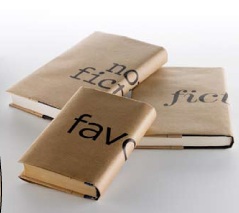
Boy, it has been years since I've put a book jacket on any book, but if you are craving to do so, Book City Jackets can supply you with the appropriate materials.
The only book I have with a protective jacket is my Sibley's bird book.
A feast of book reviews
Indie
Book Bloggers is a collection site of a huge list
of independent book reviewers. So when you are hungry
for something to read, there's a lot of choices here
daily.
The Cult of Done
03/26/09 09:27 Filed in: miscellany
Bre Pettis
and Kio Stark's
"cult of done" manifesto:
The Cult of Done Manifesto
* There are three states of being. Not knowing, action and completion.
* Accept that everything is a draft. It helps to get it done.
* There is no editing stage.
* Pretending you know what you're doing is almost the same as knowing what you are doing, so just accept that you know what you're doing even if you don't and do it.
* Banish procrastination. If you wait more than a week to get an idea done, abandon it.
* The point of being done is not to finish but to get other things done.
* Once you're done you can throw it away.
* Laugh at perfection. It's boring and keeps you from being done.
* People without dirty hands are wrong. Doing something makes you right.
* Failure counts as done. So do mistakes.
* Destruction is a variant of done.
* If you have an idea and publish it on the internet, that counts as a ghost of done.
* Done is the engine of more.
I just present this here for fun - I don't think I'm a member. For one thing, there is always an editing stage for me...
But if it appeals to you, there's supposedly a facebook group.
The Cult of Done Manifesto
* There are three states of being. Not knowing, action and completion.
* Accept that everything is a draft. It helps to get it done.
* There is no editing stage.
* Pretending you know what you're doing is almost the same as knowing what you are doing, so just accept that you know what you're doing even if you don't and do it.
* Banish procrastination. If you wait more than a week to get an idea done, abandon it.
* The point of being done is not to finish but to get other things done.
* Once you're done you can throw it away.
* Laugh at perfection. It's boring and keeps you from being done.
* People without dirty hands are wrong. Doing something makes you right.
* Failure counts as done. So do mistakes.
* Destruction is a variant of done.
* If you have an idea and publish it on the internet, that counts as a ghost of done.
* Done is the engine of more.
I just present this here for fun - I don't think I'm a member. For one thing, there is always an editing stage for me...
But if it appeals to you, there's supposedly a facebook group.
Evir connection visualizations
03/25/09 10:51 Filed in: taxonomies
| visualizations
The
Washington Post has started adding Evri connection maps to its
articles. There are still a lot of gaps in its
searches, but this is an interesting tool to play
with. Here's a sample. Clicking on each circle takes
you elsewhere.
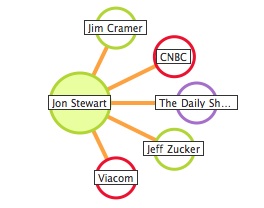
Nice representation of related terms, narrow terms, and identifying connective words. It's not a strict taxonomy, which would label the connections with broader, narrow, or other identification of the relationships, just showing relationships.

Nice representation of related terms, narrow terms, and identifying connective words. It's not a strict taxonomy, which would label the connections with broader, narrow, or other identification of the relationships, just showing relationships.
Make words out of books
03/24/09 09:16 Filed in: visualizations
Michael Tamblyn on 6 projects that could change publishing for the better
03/23/09 09:14 Filed in: books | publishing
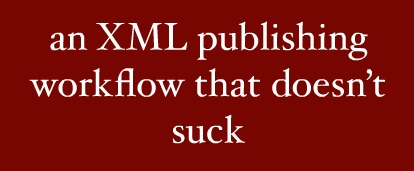
I found a lot of good thought-provoking material in this publishing-oriented slide set. Be sure to read the notes down below each slide. My favorite one is "if you show this (xml process) to most editors, they're going to start drinking at their desks."
H.W. Wilson Award
From: Peg Mauer
To: Index-l listserv
Subject: 2009 ASI/H.W. Wilson Excellence in Indexing Award
Date: Mar 21, 2009 5:24 PM
I am thrilled to announce that this year’s recipient of the ASI/H.W.
Wilson Award in Excellence in Indexing is Jan Wright, for her index to
Real World Adobe InDesign CS3, by Olav Martin Kvern and David Blatner.
The book was published by Peachpit Press in 2008. It is the first time
a technical manual has won the award!
Congratulations Jan!
The Wilson Award Committee was impressed by the detailed level of
granularity at which the index was written. Every conceivable utility,
button, dialog box and menu item was covered in the index. In addition
to the granularity, the coverage of the index was exhaustive. There did
not appear to be a single concept in the text that was not
appropriately covered in the index. Also, as is so important in a
technical manual's index, not only were software features indexed, but
actions were as well. That allows users to find information on how to
use features not just descriptions of them.
Index entries were appropriately double- or even triple-posted,
ensuring multiple access points to information. The index was written
in a concise, direct style, resulting in an index with a scientific
elegance. Generally short lines, along with a layout that used lots of
white space made for easy reading, even at the relatively small font
size. Finally, the authors' use of humor was consistently represented
in the index, which is not always an easy thing to carry off.
Jan will receive the Wilson Award, including a plaque and a check for
$1,000, at the ASI Welcome Reception on Thursday, April 23, 2009 at
Powell's City of Books in Portland, Oregon.
The Wilson Award also recognizes the contribution of the publisher to
the quality of the index. The publisher, Peachpit Press, also receives
a plaque.
The ASI/Wilson Award was established to recognize the normally
anonymous indexers and the publishers who provide high-quality indexes
to serve their readers. For more information on the H.W. Wilson Award,
see http://www.asindexing.org/site/WilsonAward.shtml. As you create
indexes this year, please consider the criteria for the award. Next
year, you could be the winner!
Thanks to all who submitted indexes this year. See you in Portland!
Peg Mauer
Chair, 2009 H.W. Wilson Award Committee
You can browse the index here at Amazon. Use the "Look Inside This Book" feature, and you can browse the index. I will probably be intolerable for a while, intolerable!
To: Index-l listserv
Subject: 2009 ASI/H.W. Wilson Excellence in Indexing Award
Date: Mar 21, 2009 5:24 PM
I am thrilled to announce that this year’s recipient of the ASI/H.W.
Wilson Award in Excellence in Indexing is Jan Wright, for her index to
Real World Adobe InDesign CS3, by Olav Martin Kvern and David Blatner.
The book was published by Peachpit Press in 2008. It is the first time
a technical manual has won the award!
Congratulations Jan!
The Wilson Award Committee was impressed by the detailed level of
granularity at which the index was written. Every conceivable utility,
button, dialog box and menu item was covered in the index. In addition
to the granularity, the coverage of the index was exhaustive. There did
not appear to be a single concept in the text that was not
appropriately covered in the index. Also, as is so important in a
technical manual's index, not only were software features indexed, but
actions were as well. That allows users to find information on how to
use features not just descriptions of them.
Index entries were appropriately double- or even triple-posted,
ensuring multiple access points to information. The index was written
in a concise, direct style, resulting in an index with a scientific
elegance. Generally short lines, along with a layout that used lots of
white space made for easy reading, even at the relatively small font
size. Finally, the authors' use of humor was consistently represented
in the index, which is not always an easy thing to carry off.
Jan will receive the Wilson Award, including a plaque and a check for
$1,000, at the ASI Welcome Reception on Thursday, April 23, 2009 at
Powell's City of Books in Portland, Oregon.
The Wilson Award also recognizes the contribution of the publisher to
the quality of the index. The publisher, Peachpit Press, also receives
a plaque.
The ASI/Wilson Award was established to recognize the normally
anonymous indexers and the publishers who provide high-quality indexes
to serve their readers. For more information on the H.W. Wilson Award,
see http://www.asindexing.org/site/WilsonAward.shtml. As you create
indexes this year, please consider the criteria for the award. Next
year, you could be the winner!
Thanks to all who submitted indexes this year. See you in Portland!
Peg Mauer
Chair, 2009 H.W. Wilson Award Committee
You can browse the index here at Amazon. Use the "Look Inside This Book" feature, and you can browse the index. I will probably be intolerable for a while, intolerable!
David's blog about the award is here.
"XML - Why Bother" presentation
03/21/09 11:18 Filed in: publishing
| books
Mary Harper found this great little presentation by Hachette Book Group on Slideshare.net. The illustrations of traditional content process vs. an XML process are really nice and understandable. Indexing as metadata fits into this flow, but of course is not included in the illustration. We need to keep after publishers to understand that the indexing is part of the necessary metadata that flows with the content.
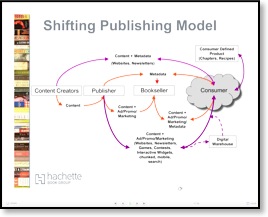
Media Cloud Visualizations
03/20/09 11:16 Filed in: visualizations
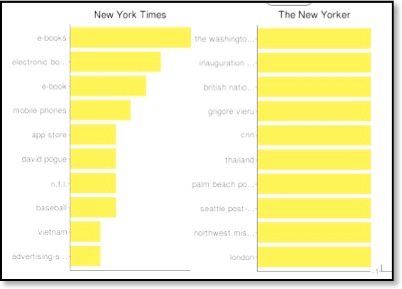
The Media Cloud Project allows you to input several data sources, like the New York Times, and create a visualization of the most frequent words, or the words most often associated with a term you enter. Quite interesting. The graph above was for a search on most-related terms for "books."
Mike Shatzkin on the book world in 10 years
I'm not so
sure I want to post this, but where will indexing
play a role in this forecast?
There is no doubt that the industry is in a period of significant transition. What can we expect 10 to 15 years from now?
Someday, all data and applications will be “in the cloud”—that is, existing independently from, but accessible by, digital devices. All the devices most used every day will then need almost no memory. When we say “screens” in that context, it will mean the same thing as saying “devices” or “computers.” The screens of the future will all connect to all the information and all the computing power all the time.
So, media consumption will take place by people choosing from a wide variety of screen configurations, the way they have always chosen from a wide variety of printed formats. That is, you’ll pick up one kind of screen/device to read a memo you’re working on, another one to look at the work of your favorite photographer, and pull a rolled-up one out of your back pocket to read a book or newspaper on the subway or at the beach. And those don’t include the ones on your walls for a movie, or for a piece of art.
Books don’t have to immediately disappear from a world like that. Print-on-demand (POD) technology means that anybody can have anything they want in book form, down to a press run of one. David Worlock of Outsell, the sagest digital (and longest-standing) guru I know, once told me, “Surely, in time, the number of books created within the network (by individuals via the Internet) must exceed the number of books created outside the network.” If you look at what SharedBook is doing now—enabling personalized books to be created and displayed as flipbooks online, downloaded as PDFs, or printed on-demand—you see the down payment on Worlock’s vision.
There's a lot more at bookbusinessmag.com.
There is no doubt that the industry is in a period of significant transition. What can we expect 10 to 15 years from now?
Someday, all data and applications will be “in the cloud”—that is, existing independently from, but accessible by, digital devices. All the devices most used every day will then need almost no memory. When we say “screens” in that context, it will mean the same thing as saying “devices” or “computers.” The screens of the future will all connect to all the information and all the computing power all the time.
So, media consumption will take place by people choosing from a wide variety of screen configurations, the way they have always chosen from a wide variety of printed formats. That is, you’ll pick up one kind of screen/device to read a memo you’re working on, another one to look at the work of your favorite photographer, and pull a rolled-up one out of your back pocket to read a book or newspaper on the subway or at the beach. And those don’t include the ones on your walls for a movie, or for a piece of art.
Books don’t have to immediately disappear from a world like that. Print-on-demand (POD) technology means that anybody can have anything they want in book form, down to a press run of one. David Worlock of Outsell, the sagest digital (and longest-standing) guru I know, once told me, “Surely, in time, the number of books created within the network (by individuals via the Internet) must exceed the number of books created outside the network.” If you look at what SharedBook is doing now—enabling personalized books to be created and displayed as flipbooks online, downloaded as PDFs, or printed on-demand—you see the down payment on Worlock’s vision.
There's a lot more at bookbusinessmag.com.
Instant one page wonder illustrated books
03/18/09 09:35 Filed in: books
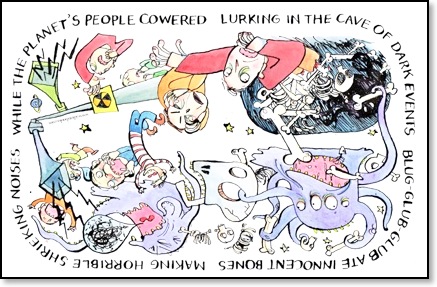
Tor is hosting One Page Wonder flip books. What fun - you print out the page, fold it, cut one piece, and you have a story that can be endlessly rearranged.
This one is Captain A-OK Fights Blug-Glub-Glub. There is a video for instructions on how to do the folding, and then how to read it.
Book reviewing and ebooks
The
Bookish Dilettante brings the ebook cloud back
down to the ground.
Enough with the ebooks, already. I mean, I guess that ebooks are rather hot at the moment, the topic du jour, and a nice horse to pin our hopes on, but -- once I figure out what ebook format and device to go with -- how much to shell out for the ebook or whether to shell out anything at all -- how do I figure out what ebook to read? There's quite a few, and they keep on coming -- along with regular old print books.
What I mean is -- in our rush to embrace the E, let's not forget about the C - curation (i just can't let go of that word, and/or concept).
Crap as an ebook, is still just ecrap. The fact that there's infinite e-shelf space for the magnitude of possible ebook ecrap does little to help me sleep well at night.
What does help me sleep well at night -- the knowledge that there are still plenty of people (real people too, not epeople) on board who want to encourage the democratization of publishing, but at the same time, help to figure out and spread the word of what a book (e, or otherwise) is about, and have stepped up to help shepherd all kinds of books to all kinds of audiences...
The Dilettante then goes on to list her favorite sources of bookish wisdom -- go explore!
1. Readerville
2. Maud Newton
3. Flashlight Worthy
4. Books on the Nightstand
5. The Word Hoarder
6. the bat segundo show
Enough with the ebooks, already. I mean, I guess that ebooks are rather hot at the moment, the topic du jour, and a nice horse to pin our hopes on, but -- once I figure out what ebook format and device to go with -- how much to shell out for the ebook or whether to shell out anything at all -- how do I figure out what ebook to read? There's quite a few, and they keep on coming -- along with regular old print books.
What I mean is -- in our rush to embrace the E, let's not forget about the C - curation (i just can't let go of that word, and/or concept).
Crap as an ebook, is still just ecrap. The fact that there's infinite e-shelf space for the magnitude of possible ebook ecrap does little to help me sleep well at night.
What does help me sleep well at night -- the knowledge that there are still plenty of people (real people too, not epeople) on board who want to encourage the democratization of publishing, but at the same time, help to figure out and spread the word of what a book (e, or otherwise) is about, and have stepped up to help shepherd all kinds of books to all kinds of audiences...
The Dilettante then goes on to list her favorite sources of bookish wisdom -- go explore!
1. Readerville
2. Maud Newton
3. Flashlight Worthy
4. Books on the Nightstand
5. The Word Hoarder
6. the bat segundo show
People lie about reading?
From the
mobylives
site:
A survey carried out by the people behind World Book Day “has found that two thirds of people have claimed to have read a book they haven’t,” and, according to a story at The Bookseller by Victoria Gallagher and Katie Allen, the “most popular book to have lied about reading is 1984 by George Orwell.” The runner-up was Leo Tolstoy’s War and Peace, followed by James Joyce’s Ulysess. Number four was, interestingly enough, the Bible... The main reason people lied about their reading (or lack thereof) was “to impress the person they were speaking to.”
The survey also came up with some other interesting reading-related observations, such as that “people can’t bear to throw their books away, with 77% of respondents saying they buy extra bookshelves when they fill up.”
Also, a statistic that most publishers would put at somewhere closer to 90%: “11% of those asked also revealed that they have written a book but not yet had it published.”
Here's the top ten list of books people claim to have read, while not having done so:
Those who lied have claimed to have read:
1984 - George Orwell (42 percent)
War and Peace - Leo Tolstoy (31)
The Bible (24)
A Brief History of Time - Stephen Hawking (15)
Midnight's Children - Salman Rushdie (14)
In Remembrance of Things Past - Marcel Proust (9)
Dreams from My Father - Barack Obama (6)
The Selfish Gene - Richard Dawkins (6)
(Reporting by Mike Collett-White)
A survey carried out by the people behind World Book Day “has found that two thirds of people have claimed to have read a book they haven’t,” and, according to a story at The Bookseller by Victoria Gallagher and Katie Allen, the “most popular book to have lied about reading is 1984 by George Orwell.” The runner-up was Leo Tolstoy’s War and Peace, followed by James Joyce’s Ulysess. Number four was, interestingly enough, the Bible... The main reason people lied about their reading (or lack thereof) was “to impress the person they were speaking to.”
The survey also came up with some other interesting reading-related observations, such as that “people can’t bear to throw their books away, with 77% of respondents saying they buy extra bookshelves when they fill up.”
Also, a statistic that most publishers would put at somewhere closer to 90%: “11% of those asked also revealed that they have written a book but not yet had it published.”
Here's the top ten list of books people claim to have read, while not having done so:
Those who lied have claimed to have read:
1984 - George Orwell (42 percent)
War and Peace - Leo Tolstoy (31)
The Bible (24)
A Brief History of Time - Stephen Hawking (15)
Midnight's Children - Salman Rushdie (14)
In Remembrance of Things Past - Marcel Proust (9)
Dreams from My Father - Barack Obama (6)
The Selfish Gene - Richard Dawkins (6)
(Reporting by Mike Collett-White)
Bruce Sterling on tagging and Web 2.0
03/13/09 11:22 Filed in: tagging
| taxonomies
From a much
longer (and very funny)
presentation at Webstock 09:
Let's look at a few of these Web 2.0 principles and practices.
"Tagging not taxonomy." Okay, I love folksonomy, but I don't think it's gone very far. There have been books written about how ambient searchability through folksonomy destroys the need for any solid taxonomy. Not really. The reality is that we don't have a choice, because we have no conceivable taxonomy that can catalog the avalanche of stuff on the Web. We have no army of human clerks remotely able to tackle that work. We don't even have permanent reference sites where we can put data so that we can taxonomize it....
"Dynamic content." Okay, content is a stable substance that is put inside a container. It's stored in there: that's why you put it inside. If it is dynamically flowing through the container, that's not a container. That is a pipe. I really like dynamic flowing pipes, but since they're not containers, you can't freakin' label them!
There's a lot more, about the next thing, which he calls the Transitional Web. Worth the read.
Let's look at a few of these Web 2.0 principles and practices.
"Tagging not taxonomy." Okay, I love folksonomy, but I don't think it's gone very far. There have been books written about how ambient searchability through folksonomy destroys the need for any solid taxonomy. Not really. The reality is that we don't have a choice, because we have no conceivable taxonomy that can catalog the avalanche of stuff on the Web. We have no army of human clerks remotely able to tackle that work. We don't even have permanent reference sites where we can put data so that we can taxonomize it....
"Dynamic content." Okay, content is a stable substance that is put inside a container. It's stored in there: that's why you put it inside. If it is dynamically flowing through the container, that's not a container. That is a pipe. I really like dynamic flowing pipes, but since they're not containers, you can't freakin' label them!
There's a lot more, about the next thing, which he calls the Transitional Web. Worth the read.
Cheer up, we could be indexing on this!
03/10/09 07:46 Filed in: indexing
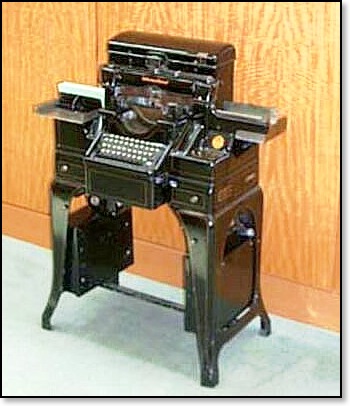
The IBM Attic site has great pictures of old calculating machines, numerators, and even a replica of the Babbage engine. There are three archives, be sure to explore all of them!
On reading, not reading, and reading for indexing
In response
to Pierre Bayard's
How to Talk About Books You Haven't Read,
Mandy Brown writes:
One of Bayard's arguments in How to Talk About Books is that the difference between reading and not reading is hard to pinpoint. If I only skim a book, does that count as reading or not reading? If I read a book years ago, but can no longer remember it, isn't that more akin to a state of not reading than of reading? Or, what if I have never opened a particular book, but can still speak about it authoritatively, because I know what other books it is similar to (or, put another way, I know its location in the library and what it means to be in that place) – is that a book that I have read, or a book that I have not read? Does it matter?
Someone with whom I spend a great deal of time is a significantly less avid reader than I am. Our arrangement is such that I read vigorously – making numerous recommendations about which books he should read – wherein he reads about one out of every dozen or so books I push in his direction. And yet a strange consequence of this coupling is that he can speak as authoritatively and compellingly as I can about books of which he has never so much as cracked the spine. It's as if I'm reading for two, and the act of reading expands from the initial contact (me, alone, with book in hand) to the later event (the two of us, talking about books, drinking wine). In a certain sense, he has read these books, in that he is as familiar with them (albeit through different means) as I am.
Underneath this theory of reading is an elevation of the ideas that a book espouses over the experience of reading it. The challenge I see therein is that ideas cannot be completely decoupled from the act of reading – cannot escape the material condition of the written language from which they are born. For me, especially, an idea must be judged in part on the merits of the words that describe it. The best ideas are therefore married to the most beautiful language; a divorce diminishes them both.
As indexers, we do more reading than the average soul, and yet, how much do we really absorb? I have noticed that when the material is technical, I absorb and keep nearly none of it within a month. But I do retain some - when our water purifier was behaving oddly, all the plumbing engineering indexing I have done led me to conclude it was a pressure issue, and lo and behold, it was. It didn't mean I could fix it, though! I retained the theory, but I didn't have the know-how, most likely because the engineering work I do contains formulas and applications in the broad sense, not specific valve issues under the sink.
When the material is fiction, the book itself dictates how much I retain, whether I got involved, lost myself, or got bored easily. But when the book is read with my book club, no matter what genre, I come away with a sense of owning it, it becomes a special book due to the act of sharing, and I retain all of those. The interaction and sharing of a book seems to mean I get to "keep" it.
When my indexing material is anthropological, historical, natural history, botany, biographical, or in other words very directly related to humans or nature, I retain a lot of it. Perhaps because it links into my experiences as a human, and whether I share it or not doesn't matter?
I'm wondering how the rest of you feel. How much do you retain? Is there a subject that stays with you longer?
One of Bayard's arguments in How to Talk About Books is that the difference between reading and not reading is hard to pinpoint. If I only skim a book, does that count as reading or not reading? If I read a book years ago, but can no longer remember it, isn't that more akin to a state of not reading than of reading? Or, what if I have never opened a particular book, but can still speak about it authoritatively, because I know what other books it is similar to (or, put another way, I know its location in the library and what it means to be in that place) – is that a book that I have read, or a book that I have not read? Does it matter?
Someone with whom I spend a great deal of time is a significantly less avid reader than I am. Our arrangement is such that I read vigorously – making numerous recommendations about which books he should read – wherein he reads about one out of every dozen or so books I push in his direction. And yet a strange consequence of this coupling is that he can speak as authoritatively and compellingly as I can about books of which he has never so much as cracked the spine. It's as if I'm reading for two, and the act of reading expands from the initial contact (me, alone, with book in hand) to the later event (the two of us, talking about books, drinking wine). In a certain sense, he has read these books, in that he is as familiar with them (albeit through different means) as I am.
Underneath this theory of reading is an elevation of the ideas that a book espouses over the experience of reading it. The challenge I see therein is that ideas cannot be completely decoupled from the act of reading – cannot escape the material condition of the written language from which they are born. For me, especially, an idea must be judged in part on the merits of the words that describe it. The best ideas are therefore married to the most beautiful language; a divorce diminishes them both.
As indexers, we do more reading than the average soul, and yet, how much do we really absorb? I have noticed that when the material is technical, I absorb and keep nearly none of it within a month. But I do retain some - when our water purifier was behaving oddly, all the plumbing engineering indexing I have done led me to conclude it was a pressure issue, and lo and behold, it was. It didn't mean I could fix it, though! I retained the theory, but I didn't have the know-how, most likely because the engineering work I do contains formulas and applications in the broad sense, not specific valve issues under the sink.
When the material is fiction, the book itself dictates how much I retain, whether I got involved, lost myself, or got bored easily. But when the book is read with my book club, no matter what genre, I come away with a sense of owning it, it becomes a special book due to the act of sharing, and I retain all of those. The interaction and sharing of a book seems to mean I get to "keep" it.
When my indexing material is anthropological, historical, natural history, botany, biographical, or in other words very directly related to humans or nature, I retain a lot of it. Perhaps because it links into my experiences as a human, and whether I share it or not doesn't matter?
I'm wondering how the rest of you feel. How much do you retain? Is there a subject that stays with you longer?
Like dying, everyone reads alone
The best
readers are obstinate. They possess a nearly
inexhaustible persistence that drives them to read,
regardless of the circumstances they find themselves
in. I’ve seen a reader absorbed in Don Quixote while
seated at a noisy bar; I’ve witnessed the
quintessential New York reader walk the streets with
a book in hand; of late I’ve seen many a reader
devour books on their iPhone (including one who
confessed to reading the entire Lord of the Rings
trilogy while scrolling with his thumb). And millions
of us read newspapers, magazines, and blogs on our
screens every day—claims that no one reads anymore
notwithstanding.
What each of these readers has in common is an ability to create solitude under circumstances that would seem to prohibit it. Reading is a necessarily solitary experience—like dying, everyone reads alone—but over the centuries readers have learned how to cultivate that solitude, how to grow it in the least hospitable environments. An experienced reader can lose herself in a good text with anything short of a war going on (and, sometimes, even then)—the horticultural equivalent of growing orchids in a desert.
Mandy Brown is a web designer who understands reading behaviors, and deliciously writes about them -- from A List Apart.
What each of these readers has in common is an ability to create solitude under circumstances that would seem to prohibit it. Reading is a necessarily solitary experience—like dying, everyone reads alone—but over the centuries readers have learned how to cultivate that solitude, how to grow it in the least hospitable environments. An experienced reader can lose herself in a good text with anything short of a war going on (and, sometimes, even then)—the horticultural equivalent of growing orchids in a desert.
Mandy Brown is a web designer who understands reading behaviors, and deliciously writes about them -- from A List Apart.
Publishers need to think about readers, not book stores
03/06/09 08:27 Filed in: books | publishing
Hugh
McGuire attended the O'Reilly Tools of Change for
publishing conference, and has written a nice piece
on what he doesn't see happening: a concern amongst
publishers for their readers. Concern for bookbuyers
is all well and good, but as media changes its frame,
the buyers are the ones they should be courting:
The question every publisher should be asking themselves every day is: how can I provide more value to my readers? I suspect the ones that start each day with that question will find the right answers, and will navigate the next few years with success.
And a few more snippets:
So, books are just one part of the picture. They are, I believe, at the base of O’Reilly’s success, the foundation upon which the company is built, but not necessarily it’s financial driver. O’Reilly is successful because they understand the value of books not as “things we can sell” but rather as “things that are of value to our customers: the readers.” O’Reilly provides readers with something of value, and gives them many many different opportunities and different routes to give money in exchange.
So: If you are in the publishing business, who is your VP of Reader Relations? Does your exec committee meet regularly to discuss: How can we sell more books and cut costs?
Or are your meetings titled: How can we deliver more value to the people who want the content we have to give them? How can we give people more opportunities to give us money for the valuable service we provide?
Do read Hugh McGuire here.
The question every publisher should be asking themselves every day is: how can I provide more value to my readers? I suspect the ones that start each day with that question will find the right answers, and will navigate the next few years with success.
And a few more snippets:
So, books are just one part of the picture. They are, I believe, at the base of O’Reilly’s success, the foundation upon which the company is built, but not necessarily it’s financial driver. O’Reilly is successful because they understand the value of books not as “things we can sell” but rather as “things that are of value to our customers: the readers.” O’Reilly provides readers with something of value, and gives them many many different opportunities and different routes to give money in exchange.
So: If you are in the publishing business, who is your VP of Reader Relations? Does your exec committee meet regularly to discuss: How can we sell more books and cut costs?
Or are your meetings titled: How can we deliver more value to the people who want the content we have to give them? How can we give people more opportunities to give us money for the valuable service we provide?
Do read Hugh McGuire here.
